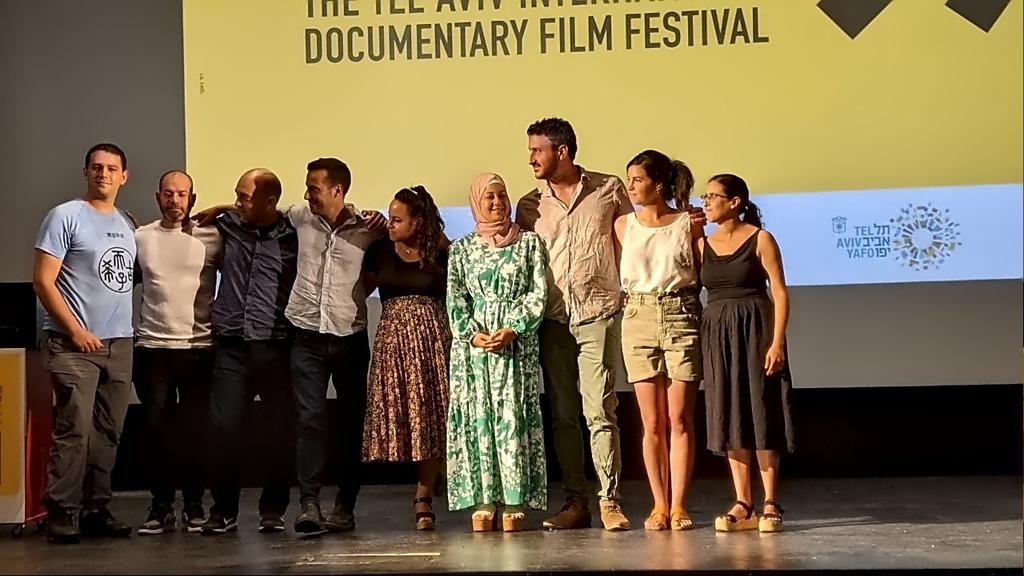Solarpunk conference, “Children of Peace”, diary
On Friday there was the DocAviv screening of “Children of Peace”, a documentary made by Maayan Schwartz on the second generation of kids who grew up in the village. It’s based on conversations with friends who grew up with Maayan. Some of them have returned to live in the village; some have made their home in different places around the world. A central theme of the film is the mixed identity that some of them feel, as people who have grown up with the narratives of both peoples and the ongoing conflict; the ways in which the conflict penetrates the village itself. It’s a powerful film, I think, though it’s hard to see it as someone who doesn’t know the people and the village might.

After the film we went with son 2 and his partner, daughter and her friend, and a few others to sit in a café. My son and his partner have just reached a decision to try living apart for a while, so this was a bit sad for all of us. We met with an old friend B – a German theologist who decided that her home was in Israel and somehow succeeded to get residency here. She has a young daughter who she is raising as a single mom. She didn’t choose an easy life but it seems to be working for them.
I don’t often go to Tel Aviv, so I’m usually surprised by all the changes. The number of high-rises that are going up and continuing to proliferate; the city’s vibrancy and pluralism. For a comparatively small city (less than a million), it has a very complex human landscape, from very rich to very poor, with refugees from Africa, ex-pats from around the world, artists and counter-culture types, financiers, LBGT people, vagrants, beggars and sex workers; just about everything that you would see in larger capital cities around the world. But this is just my perspective as someone living in a small village. An interesting place to visit; happier where I am.
Yesterday there was the conference [1] on Solarpunk. I learned quite a lot. There were artists and visionaries that not only seem to spend their lives dreaming about an alternative reality that they have imagined down to the smallest detail, but who are finding practical ways to transition towards it. My take-away was the size and breadth of the maker and hacker community, who are finding and sharing home-grown solutions that could help replace capitalism and dependence. There’s a great resource called Appropedia [2] that shares some of these.
Also yesterday we met R, who is back from Cyprus for a couple of weeks and is planning to go again as soon as his partner gets her visa. It’s good to see that they are finding a solution in a nearby country that doesn’t seem too culturally and geographically remote and fits both of their needs, perhaps. R is working on ways to distribute the book that they have been working on for a few years. They see it as not just a book but a vehicle for change.
[1] Solarpunk conference links. YouTube links below have been converted to Invidious redirects (see https://redirect.invidious.io/)
Real Solarpunk Technology
YouTube: https://redirect.invidious.io/R5o2SXBlQ9A
PeerTube: https://tube.tchncs.de/w/dckMS3s8t4iQ1DRMDdBk94
Empowering Future Communities
YouTube: https://redirect.invidious.io/x-KAjLCLaEE
PeerTube: https://tube.tchncs.de/w/gtAWuNwUGVAvcLyMYkDCj6
Is Solarpunk Just Another Style?
YouTube: https://redirect.invidious.io/U20OFV-M8V0
PeerTube: https://tube.tchncs.de/w/mttsLKtY3ZprrAJN89Sng9
What’s Holding Us Back from a Better Tomorrow?
YouTube: https://redirect.invidious.io/EqQhoWbM1z0
PeerTube: https://tube.tchncs.de/w/mB5oxCG7mH5FYbuUubN1uA
[2] Appropedia: https://www.appropedia.org/Welcome_to_Appropedia
